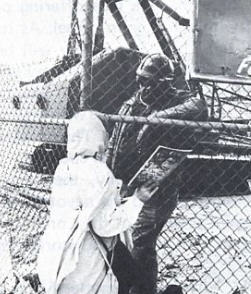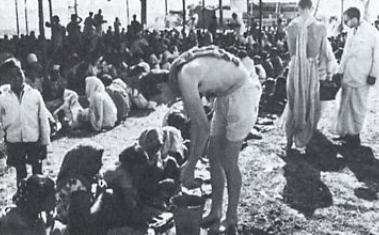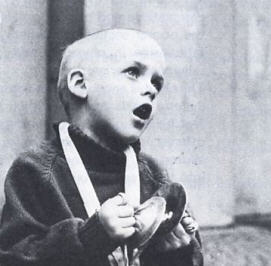The urgent need of modern society is to realize the actual human mission, which is for man to develop his eternal loving relationship with the Supreme Lord Krsna. This is the direct, one-stroke method for solving the complex social, economic and ethical problems which besiege us. Just as by watering the root of a tree one naturally provides water for all its leaves and branches, so by serving Krsna, who is the root of human society and indeed of all existence, one simultaneously renders the most valuable service to all living beings. One who has realized this simple understanding is able to act in perfection for the benefit of all.
The outlines presented below were originally used to accompany visual displays portraying major problems in all levels of society and illustrating their solutions through Krsna consciousness.
Visnu-jana Svami, an initiated disciple of His Divine Grace A.C. Bhaktivedanta Svami Prabhupada, accepted the renounced order of life (sannyasa) from His Divine Grace in July of 1970. He has traveled extensively on preaching engagements throughout the southern United States and is now touring with IS KCON's First Transcendental Exposition. The title "svami" denotes one who is able to expertly control his senses by engaging them in the service of Krsna.
Graph 1 the spiritualization of the outcast society

Visnujana Swami
I. The outcast subculture in a competitive society
A. The member of the poverty-stricken subculture, who is often born in a family disoriented from a former culture, receives inadequate instructions regarding education, language, social standards, and personal hygiene; and he is therefore unable to compete with the oriented class.
B. The educational system makes it obvious to the child that he is trapped in an inferior group. Thus, although the outcast desperately seeks a defense, there is nothing available but to obscure himself in his defeat.
C. The adorable standards of the oriented society dangle just beyond his reach, and everyone outside of the depressed community appears happy to him.
D. The youth market is full of useless commodities that are an incentive to competitive desire amongst children. Thus money for the purpose of facilitating the animal propensities of eating, sleeping, mating, and defending becomes an item of envy, and spiritual culture is neglected. The youth market encourages everyone to increase his animal propensities, and thus one's senses are totally agitated and one's mind has no peace. The fever of sense gratification prevents human energy from being engaged to solve the real problems of life, namely how to get free from the entanglement of repeated birth and death in ignorance, lust, and illusion regarding the real nature of the pure spiritual self, which is beyond the purview of the body and mind. The result is complete body consciousness. Girls dress in an overly attractive fashion. Alcohol, drugs, frivolous sports, and many more anomalies than we could possibly list become prominent in an atmosphere of material knowledge devoid of moral and spiritual culture. No amount of money is ever enough to cool this feverish mentality. Thus the bewildered children are sent to the slaughterhouse of this age under the noses of ignorant parents, teachers, and religionists.
E. Due to a sense of inferiority and frustration, the social outcaste accepts his role as a useless member of a useless society and indulges in gross bodily intoxicants and other forms of sense gratification. His mind becomes absorbed in a bodily concept of life that is full of temporary racial designations and superficial family relationships. As he becomes more and more attached to what little he has, he fearfully looks forward towards death, which, after the slow processes of old age and disease, finally takes everything from him.
F. As he grows older his pessimism increases. As he considers his hard struggle for existence, he feels cheated by society and its God. His intelligence remains bewildered until he is carried to a hospital to die, where he then meets the technologically advanced society that all his life has depressed him both spiritually and materially. Even in the face of a lifetime of defeat, he struggles against death until he is overcome by the laws of death and rebirth and is thus taken to his next body, which is better or worse according to his life's activities. His mind remains surcharged with worldly attachments, and according to the degree of his lust for over-lordship of the things of the world and according to the reactions of his pious or impious work, he is awarded a body suitable for pursuit of his mistaken interests. In most cases he returns to the animal kingdom, and his human mission of liberation is defeated.
II. Solutions to poverty in social structure

A. The leaders and intelligent class must, first of all, be trained regarding the real need of poverty-stricken people.
B. Huge exposition tents must be erected in slum areas, where devotees will invite all members of the area to join in day and night group sessions. Speakers in various languages will explain the philosophy of Krsna consciousness and its universal applications as a yoga system for complete purification. There will be chanting of the names of the Lord from every faith with nice musical accompaniment and refreshments of vegetarian food offered to the Lord in a spiritual atmosphere.
C. A devotee will visit the homes of the oppressed. He will give instructions in hygiene, and by his example the devotee will engage the family in reorienting the house as necessary to set up a simple, useful, and spiritual atmosphere with the central interest of the entire family centered on the altar.
D. Hygiene begins with regulation of life, and therefore the devotee will introduce the interested family to the following schedule:
4 am. The entire family will arise, and all its members will bathe and mark their bodies as temples of God.
5 am. After bathing, the family will gather before the altar and then bow and offer prayers to the Lord and His pure devotees to ask for their help to execute life's mission. During the prayer the mother will have made a nice offering of fruit and yogurt with some grain cereal. As it is direct service to the Lord, the family will be taught a beautiful ceremony for offering tokens of devotion. The total diet will consist of beautiful yet inexpensive preparations made with grains, fruits, vegetables, and milk products. The devotee will instruct the family in devotional cookery.
6 am. After chanting individually, the family members will eat together, and the devotee will narrate the wonderful activities of the Lord.
6:30. Philosophy for adults and stories for the children.
7:30. Cleaning the house (spotlessly) as a temple of God (lots of chanting while cleaning). The husband goes to work (see section E).
8:30. Wife and children take more prasadam (spiritual food).
9:30. Children over five are taken to the ashram. (see Graph No. 2) Children under five are taken by the mother and a woman devotee to a large grassy yard, and along with other mothers and children, they chant the glories of the Lord. If sufficient provisions are made by city planners, there can be small calves that will run loose, and milk can be churned into butter. The children will be taught to collect flowers and string them into garlands to decorate the home temple, etc.
12 noon. Mothers and children return home. Children eat and take rest for three hours, while mother and devotee garden, cook for evening prasadam, and decorate the temple.
3 pm. Older children return home and younger children awaken. All shower and mark their bodies as temples of God. Prasadam is then offered with another beautiful ceremony and with ecstatic chanting; and then prasadam is eaten.
4 pm. Devotee teaches how to enact plays and dramas on the glories of the Lord.
5 pm. Father returns and showers. The whole family chants and offers him prasadam and sees to his comfort. Seeing his family increasing its love for God, the father becomes pleased.

6 pm. The whole family, chanting and carrying prasadam to neighboring houses, goes for a walk around the block.
7 pm. Six or seven families gather together for evening festivities, puppet shows, plays depicting the pastimes of the Lord, chanting, dancing, and eating prasadam.
8:30. Younger children take rest, and adults plan upcoming activities for glorification of the Lord.
9:30. All take rest for six or seven hours.
E. Attitudes of work.
1. Work means sacrifice and, in this connection, sacrifice for the Lord. The man will be trained in the principles of Bhagavad-gita, and his work will be karma-yoga of bhakti-yoga. He will understand that he is working for the Lord, for whom he has dedicated his wife, family, and house. Thus he will also consider it his duty to see that his family can nicely serve the Lord, and he will provide for them on behalf of the Lord. Also, because of the morning worship service, he will be fixed in the real goal of life self-realization and thus be unaffected by the frequent upheavals of the working world.
2. Even in his occupational dealings, he will not falsely identify himself or others with the business world, but will consider everyone part and parcel of the Lord. He will therefore represent the Lord in all his dealings and work for the highest good of society.
F. Union leaders can institute meditative prayer and devotional songs to satisfy workers rather than superficial music. At noon, all the workers can attend a service in the business temple and eat prasadam together. Men who take part in this program will naturally come to take an interest in city planning for the glorification of the Lord and will thus become responsible citizens.
G. Workers will divide their pay 50% for spiritual activities and the rest for family maintenance.
Graph 2 The so-called affluent society
I. Spiritual poverty in the affluent society

A. The child born into prosperous conditions is high in standards of bodily hygiene, while at the same time his mind is perverted by manifold designations and prejudices. He learns to despise the poorer sections of society, and he develops false pride in physical beauty, nationality, and religious sectarianism.
B. The child is encouraged to compete in school for material goals and is punished if he does not defeat his competitors. Only material knowledge is offered in school, and the ignorant student is allured by false promises of fortune and fame into this trap of anxiety.
C. The frustration of his teen years leads to reckless driving, drinking, and drugs, and if he survives these, he then goes on to college and tries to enjoy all that was promised in his youth in the way of comfortable home and family life. His false pride increases, and he tries to impress others with an accumulation of useless commodities. He becomes bound to his false sense of proprietorship of things of this world, and this increases his fear of death, which ultimately takes away all his wealth. He strongly identifies with his extended body (his wife and children), and he hopes that by insurance plans he can continue himself after death through his extended body, the family.
D. All the plans of the materialist are subject to defeat by the changes of nature and by changes in the plans of those upon whom he depends. Therefore his life is fearful. As he grows older he continues to hope for a happy year, but he sees that his body is getting old. Due to a misdirected life of sense enjoyment, he is fearful of disease and despises old age and dependence. He makes a show of new youthfulness by imitating the dress and style of the younger generation, and he becomes falsely happy through intoxicants.
E. The bodily conception degrades him so much that as an elderly man he remains in ignorance of his spiritual self and simply engages in pampering his old and worn-out body. He takes pride in still being able to walk.
F. He becomes more diseased and feeble-minded and at last dies like a dog or cat in the best hospital money can buy.
G. According to his life's activities, he is awarded his next body, and thus his human mission is uselessly spoiled. Thus a lifetime wasted in affluent life is no better than a lifetime wasted in poverty.
II. Krsna Consciousness and the affluent society
A. As devotees gain use of the media, the mass of affluent people will see the practical result of becoming Krsna conscious. They will have the opportunity to meet devotees in their homes or in temples, and in some instances there may be exposition tents erected.
B. As in Graph No. 1, the family members will be reoriented in the real joyful values of life and will reconstruct their home and their attitudes of eating, sleeping, and working.
C. The details of the home schedule are presented in Graph No. 1.

D. Schools should be made available so that at the age of five, children would be able to attend a devotional school, staffed by intelligent men who are qualified devotees of the Lord. The main subject in the school should not differ from that in the home; that is, the criterion of advancement should be how one develops the qualities of a devotee of the Lord. Of course, education in material science would be as complete as it is presently, but it would be God-centered. The laws of nature should be taught to all students, and knowledge of the non-permanence of the body should be instructed. This would infuse everyone with a desire to fulfill his human mission. The Sanskrit Vedas contain complete knowledge of both matter and spirit, so there would be no need for speculative reasoning or misdirected experimentation on innocent animals. The present educational schedule and curriculum could be adapted as follows:
9 am. Assemble for chanting the mantras for deliverance.
9:30 Philosophy of life class. Students will learn and discuss.
10:30 Classes.
11:30 All gather for offering prasadam and take noon meal.
12:30-2:30 Classes.
1) Subjects will remain as they are now, but with new emphasis on the Lord and upon spiritual development.
2) Sanskrit will be taught along with the national language.
3) History would center largely around the appearances of the Lord and His representatives throughout the ages and throughout the universes.
4) Agrarian culture and utilization of the gifts of nature for the service of the Lord would flavor every subject with practical applications.
5) Extra-curricular activities would include the following:
a) Cooking prasadam for the noon offering.
b) Learning musical accompaniment for prayers and chanting.
c) Staging festivals and dramas to teach the public the glories of the Lord.
d) Applying all kinds of arts and crafts, even military, in the service of the Lord.
6) Competitive sporting would vanish as children experience that the Lord is the only one they need to satisfy.
7) Since there are always two paths in life, the path of sense enjoyment and the path of devotional service to the Lord, children must be given all information to make the best use of this short life for their real mission.
One such school is now functioning in Dallas, Texas, and for further details, please inquire from: Gurukula, 5430 Gurley Street, Dallas, Texas 75219
